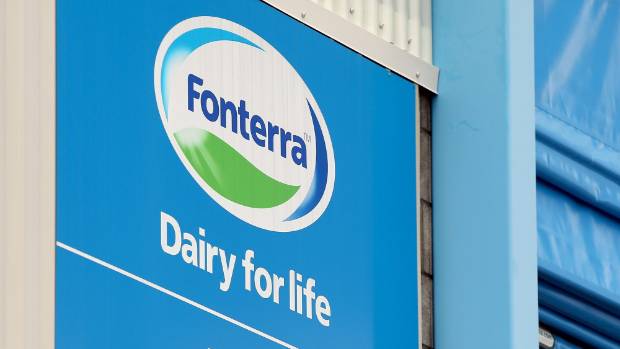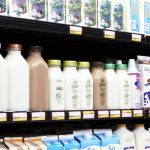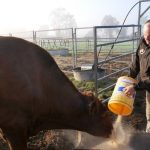
The use of permeate is dividing the milk-buying public, with Goodman Fielder using its “permeate-free” Meadow Fresh brand to compete with Anchor, positioning its milk as a more natural product.
Permeate is the yellowish liquid portion of whole milk, composed of lactose milk sugar and minerals, extracted, when, as Fonterra puts it, milk processors “take apart raw milk” for it to be later reassembled with “a specific level of each fat and protein component.”
This tearing apart and recombination is how many of the brands of milk sold in New Zealand supermarkets are “standardised” to have the same levels of fat and protein, as well as the same consistency and taste, throughout the year.
It’s also a process recognised as saving milk suppliers money, by extracting some valuable components for use in other products.
But while Fonterra is recognised as a dairy export giant, and a local supplier of locally-produced dairy products to Kiwi households, it has sought a tariff concession from Customs to import large amounts of milk permeate.
A previous tariff concession notice from early 2017 indicates it’s not the first time the cooperative has imported tonnes of milk permeate.
The dairy giant said the imported milk permeate was used solely to manufacture an export product, but would not say which one, citing privacy for the buyer.
“We clearly state to our customer that the product is manufactured from New Zealand and imported ingredients,” Fonterra said in a statement.
Moves by Goodman Fielder, and smaller dairy companies like Lewis Road Creamery to position their milks as more natural than brands of reconstituted milk have led to public debate around permeate.
New Zealand standards for whole cows’ milk for retail sale require it contain at least 3.2 per cent fat and 3 per cent protein, but they do not govern how milk is processed. And as milk permeate is derived from milk, it is not an “additive”, so it does not need to be disclosed as an ingredient on the side of a milk bottle.
Fonterra explains the use of permeate in relation to national milk supply management, making sure there’s enough milk to go around at all times of the year, and ensuring that milk had a consistency of taste and texture.
But in a video advertising Meadow Fresh, Goodman Fielder claimed its permeate-free milk contained higher levels of protein and calcium at every point during the year, never dipping below 3.5 grammes per 100ml of milk.
“Throughout the year we will have on average 25 per cent more protein in our Meadow Fresh Original Milk than the minimum required levels,” Goodman Fielder spokesman Ra Fletcher said.
Protein levels in Meadow Fresh milk were seasonal, ranging from 3.5g and 4.5g per 100ml over the year.
Anchor standard blue top milk has a standardised protein content of 3.3g throughout the year, and less calcium with 120mg per 100ml compared to an average of 135mg in Meadow Fresh.
Goodman Fielder is not opposed to standardisation. Its own Cow and Gate standardised brand of milk contains 3.1g of protein.
In Australia, permeate came under fire in 2012, when a milk price war led to documents being leaked from a major supplier, National Foods, revealing the use of permeate could shave just under 16 per cent off the cost of producing milk.
As a result of the consumer backlash, both Coles and Woolworths now sell only permeate-free milk.
Goodman Fielder said it was absorbing the extra cost of Meadow Fresh being permeate-free.
“We are providing New Zealanders the choice of having permeate-free milk at an accessible price point. We have chosen to invest in our Meadow Fresh brand and we absorb the extra cost involved in being permeate free,” Ra said.
Comparing nutritional information on milk labels around the world appear to show differences in fat, sugar and protein levels in the milk on supermarket shelves, though comparing nutritional information for standardised, and non-standardised milks is tricky, with sellers of non-standardised milks often using an average on their labels.
MILK AROUND THE WORLD:
New Zealand:
Anchor standard blue top: 3.3g of protein/3.3g fat/4.7g sugars
Meadow Fresh “Permeate free” standard blue top: “average” 3.9g per 100ml/3.3g/4.7g
Lewis Road Creamery blue top: 3.2g/3.3g/4.6g
UK:
Tesco British Whole milk: 3.5g/3.7g/4.7g
Sainsbury’s British Whole Milk: 3.5/3.7g/4.7g
Australia:
Farmers Own blue top: 3.6g/3.8g/4.6g
Riverina Full Cream Milk: 3.4g/3.5g/4.4g
Ireland:
Avonmore Fresh Milk: 3.4g/3.5g/4.7g
Canada:
Hewitt’s Dairy homogenised milk: 4.8g/3.2g/4.8g
USA:
Walmart Great Value milk: 3.3g/3.3g/5g






















